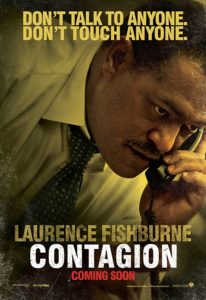I’m a fan of art imitating life, especially through the medium of film. Being able to recreate life as accurately as possible, while providing substance in an engaging and thrilling way, is a difficult endeavor. One that needs to be applauded.
Good artists connect with us in the moment. Great artists connect with us in the future.
We talk about ‘Contagion’ on the latest episode of TheWorkprint’s ‘Movie Talk’. Available on GooglePlay, iTunes, and Spotify.
Steven Soderbergh does this impeccably in his 2011 thriller “Contagion.” The acclaimed director presents a well-researched movie that warns of how disruptive a disease can be in the modern world.
Contagion is a fantastic movie because it balances out a well-paced and engaging story while presenting a subtle commentary on the systematic failures and personal tragedies within a pandemic.
With good pacing and a phenomenal cast, Soderbergh presents a timeline of events centered around the deadly MEV-1 disease traveling across the globe by means of Gwyneth Paltrow, who plays the very touchy-feely patient zero, Beth Emoff.
This film is our Modern-day Godzilla movie (specifically Gojira, 1954)
Let me explain. The story is centered around the protagonist, MEV-1, and contains several narratives that show how different aspects of society reacts to the arrival of the pandemic, but from a personal lens and not a systematic one.
For example, one story provides a perspective on an average American family during the pandemic, specifically the Emoffs, played by Gwyneth Paltrow and Matt Damon.
We are also presented with another narrative that focuses on the medical perspective. In this story line, Laurence Fishburne stars as the CDC Director, Kate Winslet plays an epidemic intelligence officer, and Marion Cottillard portrays, as a Word Health Organization epidemiologist, with each character trying to contain the disease.

This is similar to the original Godzilla flick that presents multiple narratives from different parts of society.
One of the most fun story lines within Contagion follows that of Alan Krumwiede, played by Jude Law. He is a web-based blogger who is either a journalist or a conspiracy theorist that interesting interactions with the government and the public, making one question the role of freedom of speech within a crisis.
Cottillard’s character, Dr. Leonara Orantes, also has a great storyline where she gets kidnapped in China while studying the virus and has to care for a small village that is endangered of being eradicated by the pandemic.
What’s great about the plot is that it presents a fairly accurate representation with what the systematic steps are, as well as what would happen to these figures during a pandemic, albeit with a much deadlier disease.
This is because Soderbergh and his cast and crew researched what the standard practices are during a global pandemic. The actors prepared themselves by interviewing and shadowing and captured the essence of what they would go through on a day to day basis.
By capturing the anxieties and mundanities of the characters, they are able to put their own personal touch to each character, making them more relatable to us the viewers.
And of course, the story is centered around our monster, the villain-protagonist of the story, MEV-1 – the Godzilla if you will. A deadly disease that has a 20% mortality rate, MEV-1 is ever present throughout the whole movie, a silent killer stalking all the susceptible characters.
The fact that it is invisible to all the senses —aside from the symptoms shown by people — and that it can infect anyone, is an extremely scary thought. The actors do a phenomenal job in reacting to the virus, showing how the fear can affect everyone in a nuanced way.
Laurence Fishburne’s performance as Dr. Cheever is a fantastic example because he can relay various emotions under stressful situations, as his character is torn between his job as a CDC director, while balancing being both a responsible husband and doctor.
The cinematography and the film editing are top-notch and plays into the overall angst that flows through the film. Many shots are close ups, providing a personal look into the characters expressions, an almost tightness of being there within them in that moment.
The Soundtrack Compliments the Story Telling in the Film.
Although, I’m not a fan of the music itself, it’s definitely recorded in a way to add to the overall pressure and suspense within the film that the characters have to deal with.
This is important for building up suspense and tension in the film, which the soundtrack completely does. Cliff Martinez, who composed the soundtrack, successfully matched the tone of the movie, providing anxiety ridden movie that complimented the pacing in the script. Knowing when to speed it up and slow it down, Martinez’s score definitely brings you one step closer to the characters in their moment of stress.
This is a Movie for the Vicarious at Heart
Within his thriller, Soderbergh connects with us in the future in a sense that he looks at a “what if’” scenario and provides a realistic answer to what would happen. That is why we see so many similarities to what is happening today, nine years after the release of the movie.
The movie is predicated on a lot of research, as well as a historical understanding on how plagues work, which gives it a unique edge when imitating life through art. By being able to understand the complexities of today’s societies and it’s history, alongside issues that regular people deal with, Contagion proves itself to the be a scary monster movie based heavily on reality.
